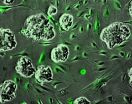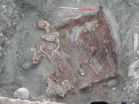(Press-News.org) Human intelligence and behavior require optimal functioning of a large number of genes, which requires enormous evolutionary pressures to maintain. A provocative hypothesis published in a recent set of Science and Society pieces published in the Cell Press journal Trends in Genetics suggests that we are losing our intellectual and emotional capabilities because the intricate web of genes endowing us with our brain power is particularly susceptible to mutations and that these mutations are not being selected against in our modern society.
"The development of our intellectual abilities and the optimization of thousands of intelligence genes probably occurred in relatively non-verbal, dispersed groups of peoples before our ancestors emerged from Africa," says the papers' author, Dr. Gerald Crabtree, of Stanford University. In this environment, intelligence was critical for survival, and there was likely to be immense selective pressure acting on the genes required for intellectual development, leading to a peak in human intelligence.
From that point, it's likely that we began to slowly lose ground. With the development of agriculture, came urbanization, which may have weakened the power of selection to weed out mutations leading to intellectual disabilities. Based on calculations of the frequency with which deleterious mutations appear in the human genome and the assumption that 2000 to 5000 genes are required for intellectual ability, Dr. Crabtree estimates that within 3000 years (about 120 generations) we have all sustained two or more mutations harmful to our intellectual or emotional stability. Moreover, recent findings from neuroscience suggest that genes involved in brain function are uniquely susceptible to mutations. Dr. Crabtree argues that the combination of less selective pressure and the large number of easily affected genes is eroding our intellectual and emotional capabilities.
But not to worry. The loss is quite slow, and judging by society's rapid pace of discovery and advancement, future technologies are bound to reveal solutions to the problem. "I think we will know each of the millions of human mutations that can compromise our intellectual function and how each of these mutations interact with each other and other processes as well as environmental influences," says Dr. Crabtree. "At that time, we may be able to magically correct any mutation that has occurred in all cells of any organism at any developmental stage. Thus, the brutish process of natural selection will be unnecessary."
###Crabtree et al.: "Our fragile intellect. Part I."
Crabtree et al.: "Our fragile intellect. Part II."
Research suggests that humans are slowly but surely losing intellectual and emotional abilities
2012-11-12
ELSE PRESS RELEASES FROM THIS DATE:
Devotes, a project to investigate marine biodiversity and the environment of European seas
2012-11-12
DEVOTES stands for "DEVelopment Of innovative Tools for understanding marine biodiversity and assessing good Environmental Status". DEVOTES is a four year project, which has a total budget of € 12 million, of which €9 million are funded by the 7th Framework Programme of the European Union. DEVOTES is coordinated by Ángel Borja, from AZTI-Tecnalia, a Spanish technological centre, specialized in marine and food research.
More than 250 scientists, from 23 research centres of 12 European Union countries, as well as Ukraine, Turkey, Saudi Arabia and USA, will work in DEVOTES ...
Surveying Earth's interior with atomic clocks
2012-11-12
Have you ever thought to use a clock to identify mineral deposits or concealed water resources within the Earth? An international team headed by astrophysicists Philippe Jetzer and Ruxandra Bondarescu from the University of Zurich is convinced that ultraprecise portable atomic clocks will make this a reality in the next decade. The scientists argue that these atomic clocks have already reached the necessary degree of precision to be useful for geophysical surveying. They say that such clocks will provide the most direct measurement of the geoid – the Earth's true physical ...
Pneumonia remains the leading killer of children despite decline in global child deaths
2012-11-12
(BALTIMORE, MARYLAND) – Marking the fourth annual World Pneumonia Day, November 12th, world leaders and the Global Coalition Against Child Pneumonia are calling for major efforts in the fight against childhood pneumonia, which remains the number one killer of children under age five. Pneumonia claimed 1.3 million lives in 2011 alone, and was responsible for nearly one in five global child deaths.
"Pneumonia can be prevented and cured. Yet, for too long it has been the leading cause of global deaths among children. We know what to do, and we have made great progress ...
Colorful wall hangings contain toxic substances
2012-11-12
Traditional Swedish bonad paintings can contain toxic substances such as arsenic, reveals new research from the University of Gothenburg, Sweden, in which painting conservator and conservation scientist Ingalill Nyström analysed the paint and techniques used in the traditional painted wall hangings from southern Sweden.
Previous research into bonad painting has always originated in the humanities, from an art/cultural history perspective.
Bonad paintings are painted wall hangings that tell a story, often with a biblical theme, and were put up in farmhouses on special ...
Good quality of life for couples who adopt
2012-11-12
Couples who adopt after unsuccessful IVF treatment have a better quality of life than both childless couples and couples without fertility problems, reveals a study from the Sahlgrenska Academy, University of Gothenburg, Sweden.
A research group comprising midwives and doctors at the Sahlgrenska Academy, University of Gothenburg, studied quality of life five years after IVF treatment in 979 men and women in the Västra Götaland region.
The study compared couples whose IVF treatment had failed with those whose treatment had resulted in children, those who did not have ...
New statistical method offers automatic mitotic cell detection for cancer diagnosis
2012-11-12
Scientists have developed a statistical image analysis method which can assist in the grading of breast cancer by automatically segmenting tumour regions and detecting dividing cells in tissue samples.
The system, developed at the University of Warwick, promises to bring objectivity and automation to the cancer grading process which is used to determine the aggressiveness of the treatment offered to the patient.
Number of mitotic cells, cells which are dividing to create new cells, is a key indicator used by histopathologists for diagnosing and grading cancer.
At present ...
Scientists at IRB BARCELONA discover a key process that allows colon cancer to metastasize
2012-11-12
A team of 17 researchers, led by scientists Eduard Batlle and Elena Sancho in the Colorectal Cancer Laboratory at the Institute for Research in Biomedicine (IRB Barcelona), have determined that the ability of colon cancer to metastasize lies in the healthy cells, called stroma, that surround the tumour. Although the stroma has long been hypothesized to be complicit in this process, this study marks the first time that healthy cells in the microenvironment have been observed to play a fundamental role in allowing metastasis to occur in a specific tumour type.
The discovery, ...
Statement on the handling of risk situations by scientists
2012-11-12
In late October, Italian scientists have been sentenced for supposedly not having warned sufficiently against the severe earthquake of L'Aquila 2009. On occasion of this verdict, the German National Academy of Sciences Leopoldina and the French Académie des sciences publish a statement concerning the handling of risks situations by scientists. We forward the statement in the exact wording.
Joint Statement of the German National Academy of Sciences Leopoldina and the French Académie des sciences, 12 November 2012
On the science-based communication of risks following ...
Mongolia and the Altai Mountains: Origins of genetic blending between Europeans and Asians
2012-11-12
A group of researchers led by the Universitat Autònoma de Barcelona (UAB) has discovered the first scientific evidence of genetic blending between Europeans and Asians in the remains of ancient Scythian warriors living over 2,000 years ago in the Altai region of Mongolia. Contrary to what was believed until now, the results published in PLoS ONE indicate that this blending was not due to an eastward migration of Europeans, but to a demographic expansion of local Central Asian populations, thanks to the technological improvements the Scythian culture brought with them.
The ...
Elsevier launches new journal: 'Health Care: The Journal of Delivery Science and Innovation'
2012-11-12
New York, November 12, 2012 – Elsevier, a world-leading provider of scientific, technical and medical information products and services, is pleased to announce the launch of Health Care: The Journal of Delivery Science and Innovation.
Health Care provides a vehicle for communicating important advances in the study of cutting edge research on innovation in health care delivery, including improvements in systems, processes, management, payment, and applied information technology. The United States health care system is undergoing unprecedented reform; Health Care builds ...


